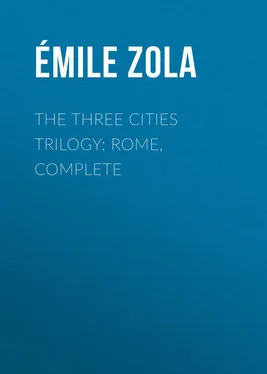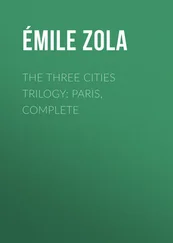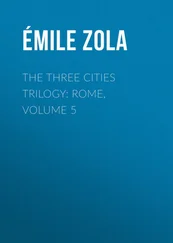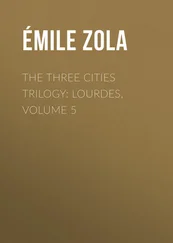Émile Zola - The Three Cities Trilogy - Rome, Complete
Здесь есть возможность читать онлайн «Émile Zola - The Three Cities Trilogy - Rome, Complete» — ознакомительный отрывок электронной книги совершенно бесплатно, а после прочтения отрывка купить полную версию. В некоторых случаях можно слушать аудио, скачать через торрент в формате fb2 и присутствует краткое содержание. Жанр: literature_19, foreign_antique, foreign_prose, на английском языке. Описание произведения, (предисловие) а так же отзывы посетителей доступны на портале библиотеки ЛибКат.
- Название:The Three Cities Trilogy: Rome, Complete
- Автор:
- Жанр:
- Год:неизвестен
- ISBN:нет данных
- Рейтинг книги:5 / 5. Голосов: 1
-
Избранное:Добавить в избранное
- Отзывы:
-
Ваша оценка:
- 100
- 1
- 2
- 3
- 4
- 5
The Three Cities Trilogy: Rome, Complete: краткое содержание, описание и аннотация
Предлагаем к чтению аннотацию, описание, краткое содержание или предисловие (зависит от того, что написал сам автор книги «The Three Cities Trilogy: Rome, Complete»). Если вы не нашли необходимую информацию о книге — напишите в комментариях, мы постараемся отыскать её.
The Three Cities Trilogy: Rome, Complete — читать онлайн ознакомительный отрывок
Ниже представлен текст книги, разбитый по страницам. Система сохранения места последней прочитанной страницы, позволяет с удобством читать онлайн бесплатно книгу «The Three Cities Trilogy: Rome, Complete», без необходимости каждый раз заново искать на чём Вы остановились. Поставьте закладку, и сможете в любой момент перейти на страницу, на которой закончили чтение.
Интервал:
Закладка:
Greatly struck, almost gained over already, Pierre listened to this clever man, charmed with his firm, clear mind. He knew how skilfully Prada had manoeuvred in the affair of the Villa Montefiori, enriching himself when every one else was ruined, having doubtless foreseen the fatal catastrophe even while the gambling passion was maddening the entire nation. However, the young priest could already detect marks of weariness, precocious wrinkles and a fall of the lips, on that determined, energetic face, as though its possessor were growing tired of the continual struggle that he had to carry on amidst surrounding downfalls, the shock of which threatened to bring the most firmly established fortunes to the ground. It was said that Prada had recently had grave cause for anxiety; and indeed there was no longer any solidity to be found; everything might be swept away by the financial crisis which day by day was becoming more and more serious. In the case of Luigi, sturdy son though he was of Northern Italy, a sort of degeneration had set in, a slow rot, caused by the softening, perversive influence of Rome. He had there rushed upon the satisfaction of every appetite, and prolonged enjoyment was exhausting him. This, indeed, was one of the causes of the deep silent sadness of Orlando, who was compelled to witness the swift deterioration of his conquering race, whilst Sacco, the Italian of the South – served as it were by the climate, accustomed to the voluptuous atmosphere, the life of those sun-baked cities compounded of the dust of antiquity – bloomed there like the natural vegetation of a soil saturated with the crimes of history, and gradually grasped everything, both wealth and power.
As Orlando spoke of Stefana’s visit to his son, Sacco’s name was mentioned. Then, without another word, the two men exchanged a smile. A rumour was current that the Minister of Agriculture, lately deceased, would perhaps not be replaced immediately, and that another minister would take charge of the department pending the next session of the Chamber.
Next the Palazzo Boccanera was mentioned, and Pierre, his interest awakened, became more attentive. “Ah!” exclaimed Count Luigi, turning to him, “so you are staying in the Via Giulia? All the Rome of olden time sleeps there in the silence of forgetfulness.”
With perfect ease he went on to speak of the Cardinal and even of Benedetta – “the Countess,” as he called her. But, although he was careful to let no sign of anger escape him, the young priest could divine that he was secretly quivering, full of suffering and spite. In him the enthusiastic energy of his father appeared in a baser, degenerate form. Quitting the yet handsome Princess Flavia in his passion for Benedetta, her divinely beautiful niece, he had resolved to make the latter his own at any cost, determined to marry her, to struggle with her and overcome her, although he knew that she loved him not, and that he would almost certainly wreck his entire life. Rather than relinquish her, however, he would have set Rome on fire. And thus his hopeless suffering was now great indeed: this woman was but his wife in name, and so torturing was the thought of her disdain, that at times, however calm his outward demeanour, he was consumed by a jealous vindictive sensual madness that did not even recoil from the idea of crime.
“Monsieur l’Abbe is acquainted with the situation,” sadly murmured old Orlando.
His son responded by a wave of the hand, as though to say that everybody was acquainted with it. “Ah! father,” he added, “but for you I should never have consented to take part in those proceedings for annulling the marriage! The Countess would have found herself compelled to return here, and would not nowadays be deriding us with her lover, that cousin of hers, Dario!”
At this Orlando also waved his hand, as if in protest.
“Oh! it’s a fact, father,” continued Luigi. “Why did she flee from here if it wasn’t to go and live with her lover? And indeed, in my opinion, it’s scandalous that a Cardinal’s palace should shelter such goings-on!”
This was the report which he spread abroad, the accusation which he everywhere levelled against his wife, of publicly carrying on a shameless liaison . In reality, however, he did not believe a word of it, being too well acquainted with Benedetta’s firm rectitude, and her determination to belong to none but the man she loved, and to him only in marriage. However, in Prada’s eyes such accusations were not only fair play but also very efficacious.
And now, although he turned pale with covert exasperation, and laughed a hard, vindictive, cruel laugh, he went on to speak in a bantering tone of the proceedings for annulling the marriage, and in particular of the plea put forward by Benedetta’s advocate Morano. And at last his language became so free that Orlando, with a glance towards the priest, gently interposed: “Luigi! Luigi!”
“Yes, you are right, father, I’ll say no more,” thereupon added the young Count. “But it’s really abominable and ridiculous. Lisbeth, you know, is highly amused at it.”
Orlando again looked displeased, for when visitors were present he did not like his son to refer to the person whom he had just named. Lisbeth Kauffmann, very blonde and pink and merry, was barely thirty years of age, and belonged to the Roman foreign colony. For two years past she had been a widow, her husband having died at Rome whither he had come to nurse a complaint of the lungs. Thenceforward free, and sufficiently well off, she had remained in the city by taste, having a marked predilection for art, and painting a little, herself. In the Via Principe Amadeo, in the new Viminal district, she had purchased a little palazzo, and transformed a large apartment on its second floor into a studio hung with old stuffs, and balmy in every season with the scent of flowers. The place was well known to tolerant and intellectual society. Lisbeth was there found in perpetual jubilation, clad in a long blouse, somewhat of a gamine in her ways, trenchant too and often bold of speech, but nevertheless capital company, and as yet compromised with nobody but Prada. Their liaison had begun some four months after his wife had left him, and now Lisbeth was near the time of becoming a mother. This she in no wise concealed, but displayed such candid tranquillity and happiness that her numerous acquaintances continued to visit her as if there were nothing in question, so facile and free indeed is the life of the great cosmopolitan continental cities. Under the circumstances which his wife’s suit had created, Prada himself was not displeased at the turn which events had taken with regard to Lisbeth, but none the less his incurable wound still bled.
There could be no compensation for the bitterness of Benedetta’s disdain, it was she for whom his heart burned, and he dreamt of one day wreaking on her a tragic punishment.
Pierre, knowing nothing of Lisbeth, failed to understand the allusions of Orlando and his son. But realising that there was some embarrassment between them, he sought to take countenance by picking from off the littered table a thick book which, to his surprise, he found to be a French educational work, one of those manuals for the baccalaureat , 29 29 The examination for the degree of bachelor, which degree is the necessary passport to all the liberal professions in France. M. Zola, by the way, failed to secure it, being ploughed for “insufficiency in literature”! – Trans.
containing a digest of the knowledge which the official programmes require. It was but a humble, practical, elementary work, yet it necessarily dealt with all the mathematical, physical, chemical, and natural sciences, thus broadly outlining the intellectual conquests of the century, the present phase of human knowledge.
Интервал:
Закладка:
Похожие книги на «The Three Cities Trilogy: Rome, Complete»
Представляем Вашему вниманию похожие книги на «The Three Cities Trilogy: Rome, Complete» списком для выбора. Мы отобрали схожую по названию и смыслу литературу в надежде предоставить читателям больше вариантов отыскать новые, интересные, ещё непрочитанные произведения.
Обсуждение, отзывы о книге «The Three Cities Trilogy: Rome, Complete» и просто собственные мнения читателей. Оставьте ваши комментарии, напишите, что Вы думаете о произведении, его смысле или главных героях. Укажите что конкретно понравилось, а что нет, и почему Вы так считаете.












